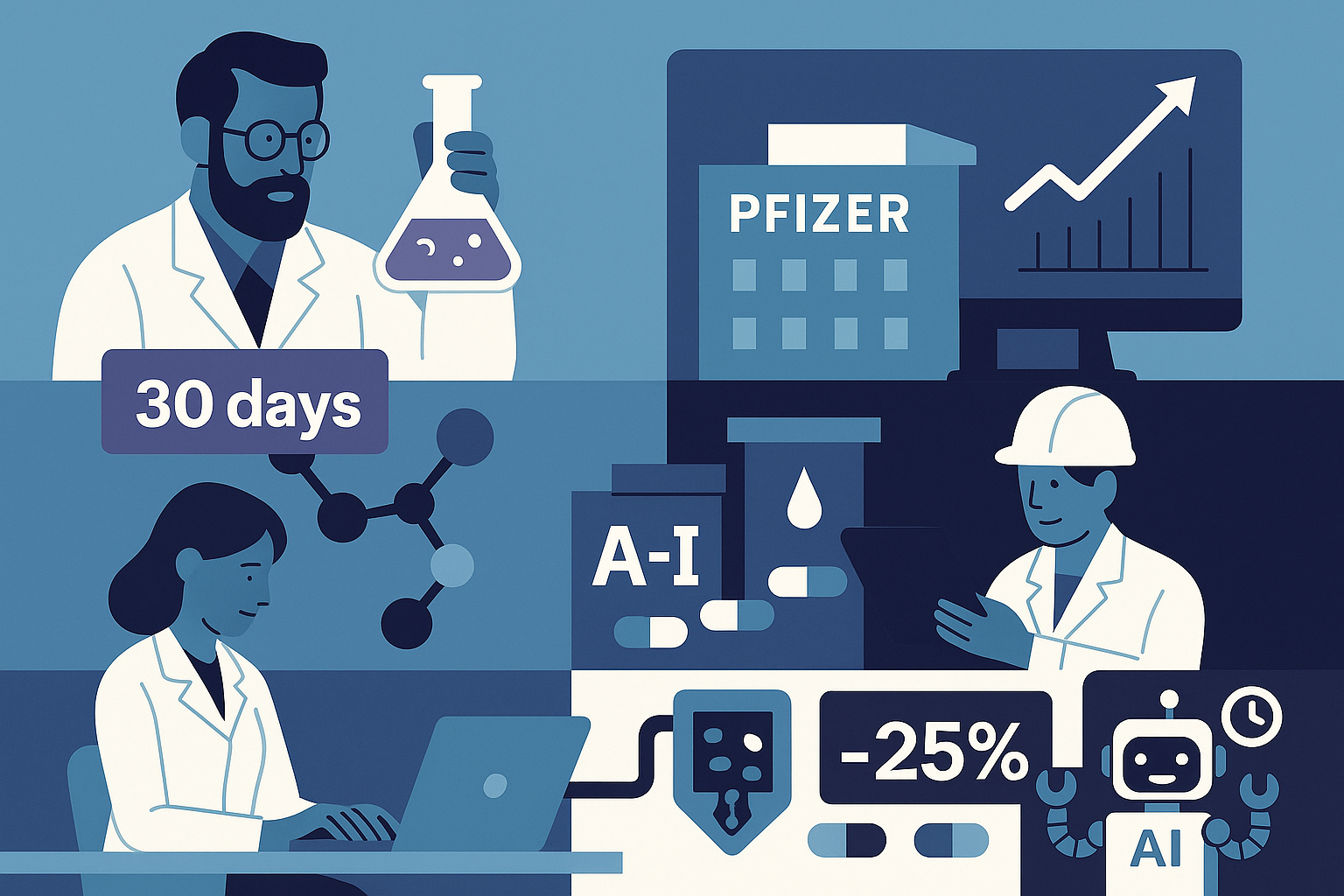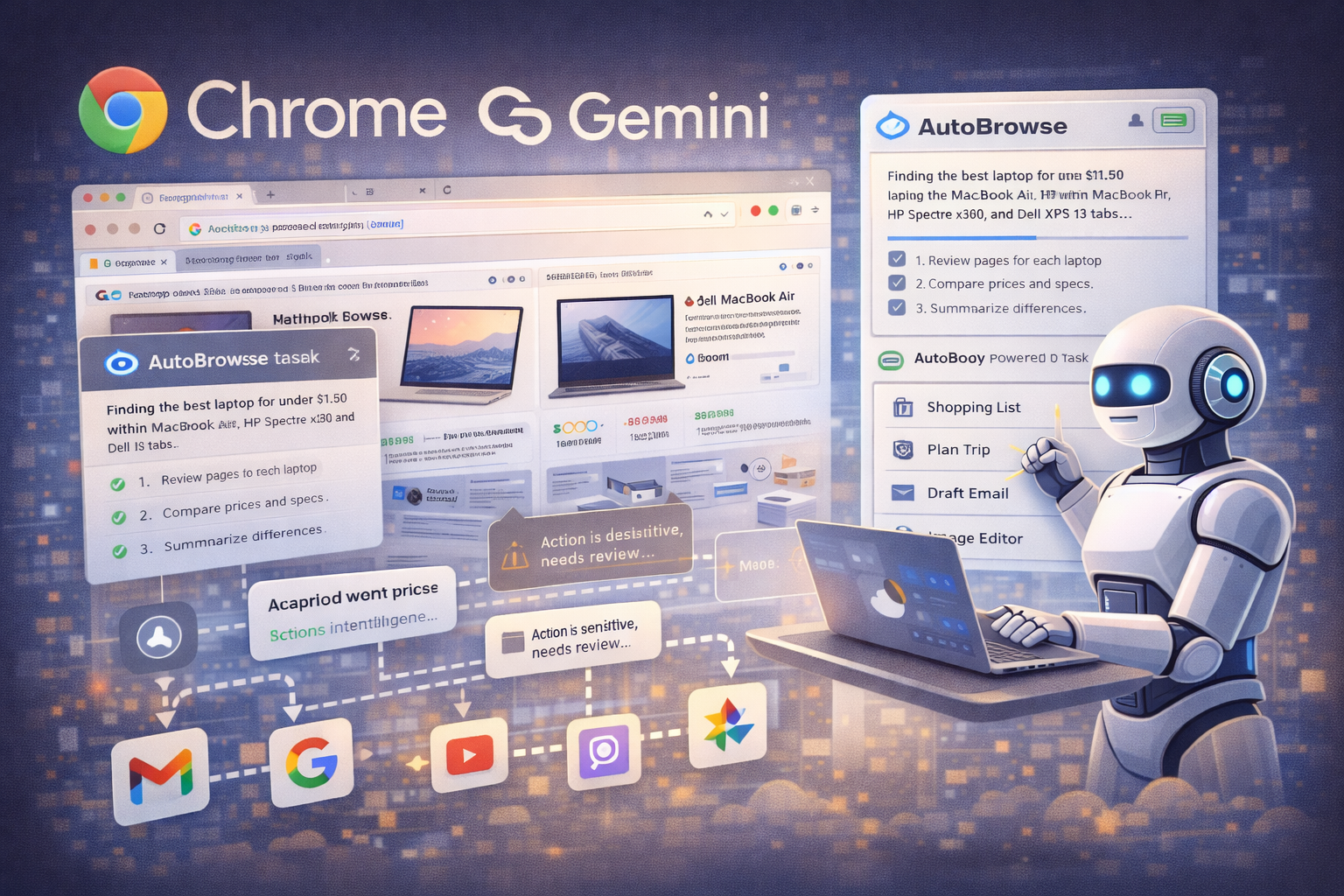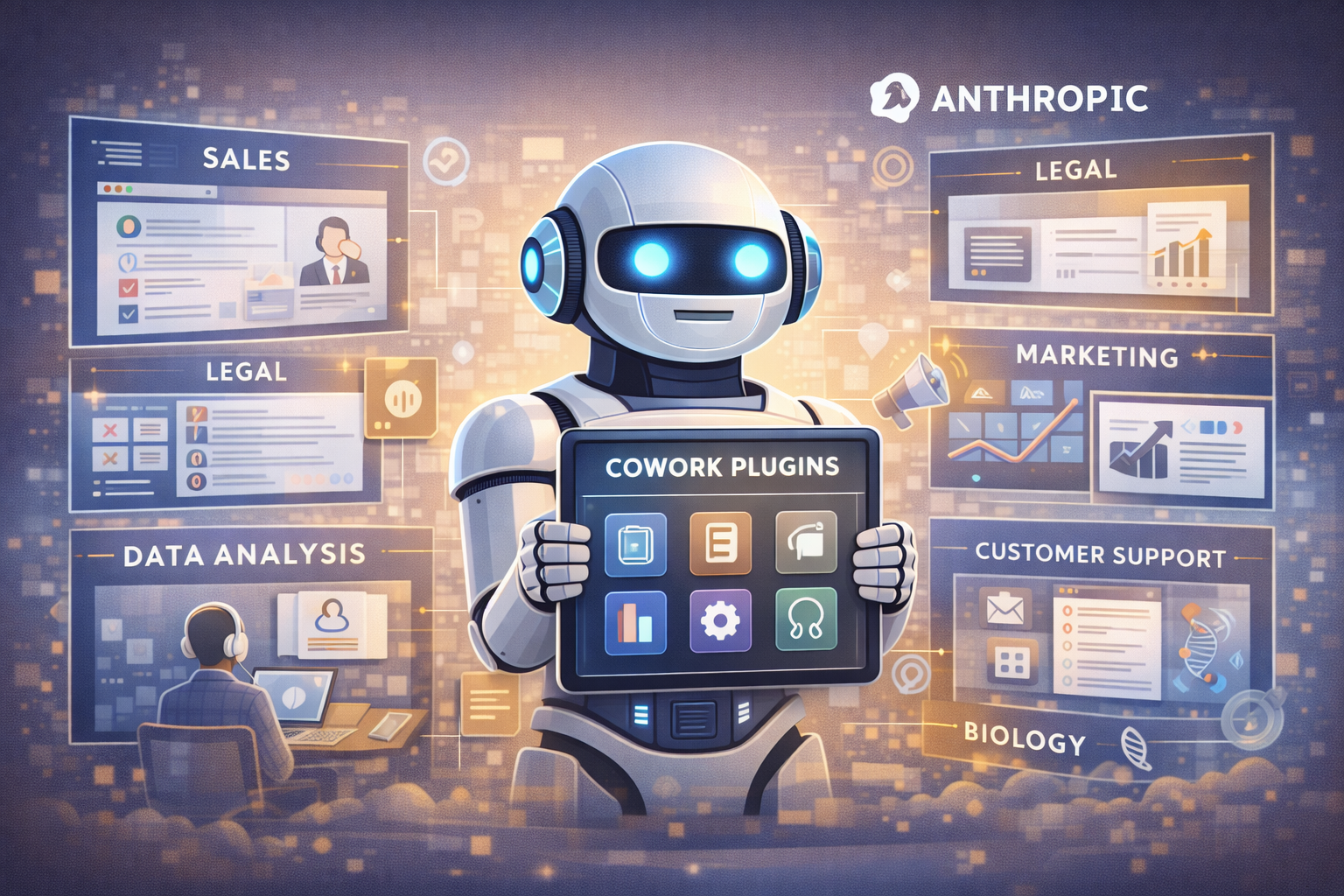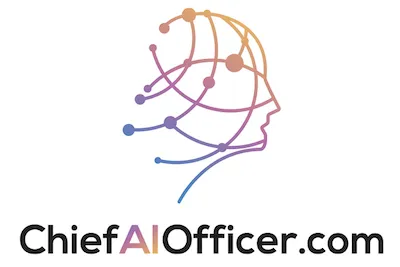Most executives think they understand what AI transformation looks like. They talk about efficiency gains and cost savings. They run pilot programs and discuss potential applications.
Then you see what Pfizer actually accomplished with AI implementation, and you realize most executives aren’t even playing the same game.
Pfizer didn’t just improve their operations with AIm they fundamentally rewrote the rules of pharmaceutical business. They cut drug discovery timelines from years to 30 days. They saved 16,000 hours annually in research alone. They boosted manufacturing yields by 10% and reduced cycle times by 25%. And they did it all while their competitors were still forming AI committees.
This isn’t a story about pharmaceutical innovation. This is a masterclass in executive AI leadership that every business leader needs to study, regardless of industry.
The 30-Day Drug Discovery Revolution
When Pfizer’s leadership decided to build "the next generation of tools to use across the preclinical and clinical development spectrum," they weren’t talking about incremental improvements. They were talking about collapsing timelines that the entire industry accepted as unchangeable.
Traditional drug discovery takes months or years to identify promising molecules. Pfizer’s AI-powered predictive machine learning research hub can now do it in 30 days or less. Think about what that means for competitive advantage. While competitors are six months into molecule identification, Pfizer is already moving to the next phase of development.
Executive teams spend longer than 30 days deciding which AI tools to evaluate. Meanwhile, Pfizer is using AI to compress entire phases of their core business process into timeframes that make traditional competition impossible.
The Partnership Strategy That Changes Everything
Here’s what most executives miss when they study Pfizer’s AI success: they didn’t try to build everything in-house. Their partnership with Flagship Pioneering leverages the AI-powered Logica platform to discover new molecules for autoimmune diseases. Their collaboration with AWS provides generative AI capabilities across manufacturing and research.
This partnership approach reveals strategic thinking that separates winning executives from those who get stuck in implementation paralysis. Instead of debating whether to build or buy AI capabilities, Pfizer focused on results. They identified the best AI platforms available and integrated them into their operations faster than competitors could evaluate their options.
Every executive team faces the same build-versus-partner decision. The companies that move fast choose partnerships that accelerate implementation. The companies that move slow get caught in analysis paralysis about developing proprietary solutions.
The Manufacturing Transformation That Proves AI ROI
Pfizer’s manufacturing AI implementation delivers the kind of measurable results that every executive team demands but few achieve. Their generative AI platform detects anomalies and suggests real-time actions for operators, boosting product yield by 10% and reducing cycle time by 25%.
But here’s the detail that should get every CEO’s attention: AI-powered manufacturing increased throughput by 20%. In pharmaceutical manufacturing, a 20% throughput increase translates to millions of dollars in additional revenue and faster delivery of life-saving medications to patients.
This isn’t theoretical ROI projection or pilot program potential. This is documented performance improvement that flows directly to the bottom line. When executives ask for proof that AI delivers measurable business value, results like this provide the answer.
The Research Efficiency Breakthrough
Pfizer’s collaboration with AWS demonstrates how AI transforms knowledge work in ways most executives don’t anticipate. Using generative AI tools like Anthropic’s Claude, Pfizer enables natural language searches across vast datasets, cutting search time by 80% and saving scientists 16,000 hours annually.
Think about what 16,000 saved hours means for a pharmaceutical company. That’s eight full-time researchers worth of productivity gain from implementing better search capabilities. Those researchers can focus on critical scientific work instead of administrative tasks, accelerating innovation across every project.
Executive teams obsess over headcount and productivity metrics, but they miss opportunities like this. AI doesn’t just automate tasks, it eliminates entire categories of unproductive work that high-value employees shouldn’t be doing anyway.
The Clinical Trial Revolution
Pfizer’s use of AI in clinical trials reveals how artificial intelligence transforms regulated industries that most executives assume are immune to technological disruption. AI helps predict which drugs are likely to succeed or fail early in the process, as demonstrated in the development of Paxlovid for COVID-19.
Virtual screening and AI-powered analysis helped select optimal molecular changes, speeding up development and decision-making when speed literally meant saving lives. AI is also being used to automate the production of regulatory documents and anticipate questions from government agencies, saving weeks in the regulatory process.
This regulatory application should get the attention of every executive in a compliance-heavy industry. If AI can accelerate pharmaceutical regulatory approval, one of the most complex regulatory processes in business, it can transform regulatory compliance in any industry.
The Supply Chain Intelligence Advantage
Pfizer’s AI implementation in supply chain management demonstrates predictive capabilities that create sustainable competitive advantages. AI models monitor continuous drug production, predict equipment maintenance needs, and minimize waste and operational disruptions.
Most importantly, AI enables Pfizer to forecast drug shortages before they occur, helping prevent disruptions that could impact patient care and company revenue. This predictive capability transforms supply chain management from reactive problem-solving to proactive optimization.
Every executive deals with supply chain complexity and disruption risk. Pfizer’s approach shows how AI transforms supply chain management from cost center to competitive advantage by providing visibility and control that traditional approaches can’t match.
The Patient Access Innovation
Pfizer’s AI-powered patient programs reveal how artificial intelligence transforms customer experience in ways that scale globally. Their atrial fibrillation management initiative automatically adapts educational videos to multiple languages and regulatory requirements, improving patient access and understanding worldwide.
In the Middle East, Russia, and Africa, Pfizer uses AI to support patient-centric access programs, reaching millions and helping patients make informed treatment decisions. This global scalability demonstrates how AI enables companies to deliver personalized experiences at massive scale.
The customer experience implications extend beyond healthcare. Any company serving global markets faces the same localization and personalization challenges. Pfizer’s approach shows how AI solves scalability problems that manual approaches can’t address.
The Innovation Culture Transformation
The Pfizer-Amazon Collaboration Team (PACT) reveals how AI implementation transforms organizational culture and innovation speed. They’ve accelerated the prototyping of AI-driven solutions, reducing development cycles from months to just six weeks and fostering experimentation in areas like risk assessment and augmented reality training.
This timeline compression in innovation cycles should concern every executive whose company still measures AI projects in quarters or years. When market leaders can prototype and test AI solutions in six weeks, traditional innovation timelines become competitively obsolete.
Executive teams spend six weeks just getting AI projects approved, while companies like Pfizer are completing entire development cycles. The cultural and operational implications of this speed difference compound every month.
The Leadership Commitment That Makes It Work
Pfizer’s CEO and leadership have made AI a core part of the company’s 2025 priorities, focusing on expanding margins, simplifying operations, and driving efficiencies through technology. This isn’t AI as a side project or experimental initiative, this is AI as fundamental business strategy.
The leadership commitment extends beyond budget allocation to organizational transformation. When executives make AI a core priority, it changes how every department thinks about process improvement, resource allocation, and competitive positioning.
Most companies treat AI as a technology project managed by IT departments. Pfizer treats AI as a business transformation managed by executive leadership. That difference in approach explains the difference in results.
The Competitive Implications Every Executive Must Understand
Pfizer’s AI implementation creates competitive dynamics that extend far beyond the pharmaceutical industry. When a major company can compress critical business processes from months to days, it changes competitive timelines for everyone in their market ecosystem.
Suppliers, partners, distributors, and even companies in adjacent markets need to adapt to the speed and capabilities that AI-powered companies establish as new market standards. If Pfizer can develop and test new treatments in weeks instead of months, what does that mean for regulatory agencies, clinical research organizations, and healthcare providers?
These competitive implications cascade across entire industries. The companies that understand this ripple effect and adapt proactively maintain competitive relevance. The companies that treat Pfizer’s AI success as a pharmaceutical story miss the broader transformation signal.
The Strategic Framework Every Executive Needs
Pfizer’s AI implementation provides a strategic framework that any executive team can adapt, regardless of industry. The framework has four core components that drive measurable results across different business functions.
First, identify the highest-impact business processes that currently limit competitive advantage. Pfizer focused on drug discovery timelines, manufacturing efficiency, and research productivity because these processes directly impact revenue and market position.
Second, establish partnerships that accelerate implementation rather than trying to build proprietary solutions. Pfizer’s partnerships with AWS, Flagship Pioneering, and other AI platforms delivered results faster than internal development could have achieved.
Third, measure success based on business outcomes, not technology metrics. Pfizer tracks revenue impact, time savings, and competitive advantage rather than AI adoption rates or system performance statistics.
Fourth, ensure executive leadership owns AI strategy as business strategy, not technology strategy. Pfizer’s CEO made AI a core 2025 priority because AI success requires organizational commitment that only executive leadership can provide.
The Timeline Reality Check
Pfizer’s AI achievements reveal timeline expectations that should recalibrate every executive’s AI strategy. Six-week development cycles, 30-day discovery processes, and 80% efficiency improvements don’t happen through gradual implementation or cautious pilot programs.
These results require executive teams that make decisions fast and implement faster. They require organizational cultures that prioritize speed over perfection and results over process. They require leadership that understands AI transformation timelines move at startup speed, not traditional corporate speed.
Companies that approach AI with traditional project management timelines will find themselves competing against organizations that operate at AI speed. The competitive implications of this timeline difference become insurmountable over time.
The Investment Philosophy That Drives Results
Pfizer’s approach to AI investment reveals a philosophy that separates successful implementations from failed experiments. Instead of limiting AI initiatives to cost reduction or process improvement, Pfizer invested in AI capabilities that create new competitive advantages.
Drug discovery acceleration creates competitive advantages that compound over time. Manufacturing optimization creates margin advantages that improve with scale. Research efficiency creates innovation advantages that accelerate product development. Patient access improvements create market advantages that expand globally.
Executive teams that invest in AI for defensive purposes, cost cutting, risk reduction, compliance improvement, miss the opportunity to create offensive competitive advantages. Pfizer’s investment philosophy focuses on AI capabilities that attack markets rather than defend market position.
What Happens Next
Pfizer’s AI implementation is not a destination, it’s an ongoing transformation that will continue accelerating competitive advantages over time. The AI capabilities they’ve implemented create compounding benefits that increase market distance between Pfizer and competitors who haven’t made similar investments.
This compounding effect should concern every executive in every industry. The companies that start comprehensive AI implementation now can still compete with early leaders like Pfizer. The companies that wait another year or two will find the competitive gap too large to close.
The choice facing every executive team is simple: begin comprehensive AI implementation now or accept permanent competitive disadvantage to companies that have already made that choice.
The Leadership Decision That Changes Everything
Pfizer’s AI success isn’t about pharmaceutical expertise or technology resources. It’s about executive leadership that recognizes transformation opportunities and commits organizational resources to capturing those opportunities faster than competitors.
Every executive team has access to the same AI technologies and partnerships that Pfizer leveraged. The difference between Pfizer’s results and typical corporate AI initiatives isn’t capability, it’s commitment. It’s leadership that treats AI transformation as an existential business priority rather than an interesting technology experiment.
The executives who study Pfizer’s approach and adapt it to their own industries will dominate their markets for the next decade. The executives who dismiss it as pharmaceutical-specific innovation will spend that decade explaining to stakeholders why their competitors pulled so far ahead.




